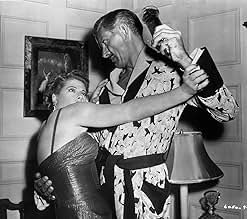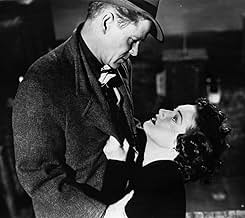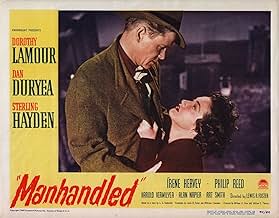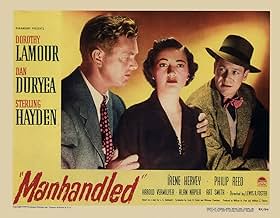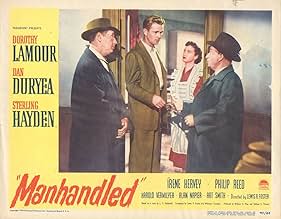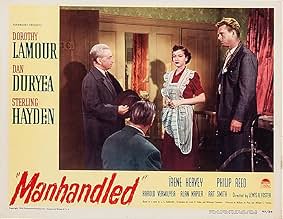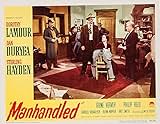Ajouter une intrigue dans votre langueThe secretary to a psychiatrist finds herself caught up in the murder of a patient's wife and realizes that her life is also in danger.The secretary to a psychiatrist finds herself caught up in the murder of a patient's wife and realizes that her life is also in danger.The secretary to a psychiatrist finds herself caught up in the murder of a patient's wife and realizes that her life is also in danger.
- Director
- Writers
- Stars
Stanley Blystone
- Cop
- (uncredited)
Paul E. Burns
- Pawn Shop Owner
- (uncredited)
James Edwards
- Henry, Bennet's Butler
- (uncredited)
Morgan Farley
- Doc, Police Lab Man
- (uncredited)
John George
- Newspaper Vendor
- (uncredited)
George Humbert
- Italian Restaurant Owner
- (uncredited)
Ray Hyke
- Detective Phil Wilson
- (uncredited)
Donald Kerr
- Reporter
- (uncredited)
Avis en vedette
A stuffy novelist (Alan Napier) suffers recurring nightmares that he bludgeons his rich jewel-horse of a wife (Irene Hervey) to death with a `quart' bottle of cologne. That's bad enough, but what's worse is that he confides his dreams to a shrink (Harold Vermilyea). Didn't he know that it was the 1940s, when psychiatry was little more than a hotbed of scheming quacks? So when his wife inevitably winds up dead (and her diamonds stolen), he becomes the prime suspect, even though she had been out clubbing with another man (Philip Reed).
That's the uptown side of Manhandled; there's a seedier angle as well. The psychiatrist's transcriptionist (Dorothy Lamour) not only sits in on his sessions but later climbs the stairs to her Manhattan walk-up and spills the beans to her neighbor Dan Duryea, an ex-cop now doing repo jobs and divorce frame-ups. So much for codes of confidentiality. But when a signet ring she found while vacuuming her sofa and then pawned brings the police to her door, along with insurance investigator Sterling Hayden, it starts to look bad. It doesn't help that she just blew in from Los Angeles with forged letters of reference....
Manhandled unfurls an elaborate, and none too plausible, mystery plot competently enough, even with a few skillful touches (in its final quarter, it takes a sharp turn toward noir, and better late than never). Director Lewis Foster, however, failed to optimize the solid cast he was handed: Hayden's part never comes into clear focus and Lamour plays little more than a bland patsy. Duryea dominates, with his familiar two-faced persona as the cheery suck-up who likes to slap women around; Art Smith, as the comic relief of the police detective, becomes, after Duryea, the movie's most memorable character. It's not a bad movie, despite a couple of clunky flashbacks. But in better hands, it could have become one of the better noirs. As it stands, it merits that dark and honorable designation only by the skin of its teeth.
That's the uptown side of Manhandled; there's a seedier angle as well. The psychiatrist's transcriptionist (Dorothy Lamour) not only sits in on his sessions but later climbs the stairs to her Manhattan walk-up and spills the beans to her neighbor Dan Duryea, an ex-cop now doing repo jobs and divorce frame-ups. So much for codes of confidentiality. But when a signet ring she found while vacuuming her sofa and then pawned brings the police to her door, along with insurance investigator Sterling Hayden, it starts to look bad. It doesn't help that she just blew in from Los Angeles with forged letters of reference....
Manhandled unfurls an elaborate, and none too plausible, mystery plot competently enough, even with a few skillful touches (in its final quarter, it takes a sharp turn toward noir, and better late than never). Director Lewis Foster, however, failed to optimize the solid cast he was handed: Hayden's part never comes into clear focus and Lamour plays little more than a bland patsy. Duryea dominates, with his familiar two-faced persona as the cheery suck-up who likes to slap women around; Art Smith, as the comic relief of the police detective, becomes, after Duryea, the movie's most memorable character. It's not a bad movie, despite a couple of clunky flashbacks. But in better hands, it could have become one of the better noirs. As it stands, it merits that dark and honorable designation only by the skin of its teeth.
Really loved the idea for the story, and 'Manhandled' is exactly my kind of film as a fan of crime, mystery and thriller in all media. Sterling Hayden was always watchable when he was in good roles. Likewise with Dorothy Lamour. It was interesting too seeing a pre-Alfred (from 'Batman') Alan Napier. Other than the story and my love for the genres, my main reason for seeing 'Manhandled' was for Dan Duryea in a role he could play at the back of his hand with no problem.
'Manhandled', after watching it, is worth a look. If you love Duryea and in the type of role he plays here, you won't be disappointed. If one wants a story that consistently grabs the attention and is consistently easy to follow, dependent on personal tastes 'Manhandled' may underwhelm, like it did with me. Is it a bad film? Of course not. There is plenty going for it and it is above average. It just had a lot of potential to be great.
Beginning with the good things, 'Manhandled' is shot and designed with a gritty and classy atmosphere that never lets up. It's a very good looking film without looking too clean or unneccessarily lavish. The music is suitably ominous when used. The script is generally tight and intriguing.
There is some nice tension in the storytelling, especially towards the end when things do become exciting, and did like that the atmosphere was uncompromising and had a seediness about it at times. Napier is a delight in his role and Art Smith is amusing in his. Hayden does quite well and in command with what he is given to work with and his character is not very well fleshed out. Stealing the film is a genuinely sinister Duryea, his face alone unsettles you.
Lamour is a lot less good however in my view. Her role is practically a nothing cipher and Lamour is very bland in it. The direction is competent enough if undistinguished and could have generated a lot more tension and crispness, some of the middle felt on the pedestrian side.
Although the story has moments, it tended to be too convoluted as a result of too much going on and too many characters. The flashbacks do intrigue in parts but generally slow the pace down and further confuses the story rather than making it clearer.
Concluding, above average but not much more. 6/10
'Manhandled', after watching it, is worth a look. If you love Duryea and in the type of role he plays here, you won't be disappointed. If one wants a story that consistently grabs the attention and is consistently easy to follow, dependent on personal tastes 'Manhandled' may underwhelm, like it did with me. Is it a bad film? Of course not. There is plenty going for it and it is above average. It just had a lot of potential to be great.
Beginning with the good things, 'Manhandled' is shot and designed with a gritty and classy atmosphere that never lets up. It's a very good looking film without looking too clean or unneccessarily lavish. The music is suitably ominous when used. The script is generally tight and intriguing.
There is some nice tension in the storytelling, especially towards the end when things do become exciting, and did like that the atmosphere was uncompromising and had a seediness about it at times. Napier is a delight in his role and Art Smith is amusing in his. Hayden does quite well and in command with what he is given to work with and his character is not very well fleshed out. Stealing the film is a genuinely sinister Duryea, his face alone unsettles you.
Lamour is a lot less good however in my view. Her role is practically a nothing cipher and Lamour is very bland in it. The direction is competent enough if undistinguished and could have generated a lot more tension and crispness, some of the middle felt on the pedestrian side.
Although the story has moments, it tended to be too convoluted as a result of too much going on and too many characters. The flashbacks do intrigue in parts but generally slow the pace down and further confuses the story rather than making it clearer.
Concluding, above average but not much more. 6/10
... makes this film. Paramount made another film with the exact same name 25 years before, but it was a Gloria Swanson film very much of its time, and this is a film very much of its time - the film noir cycle. And the title is a bit bewildering since "manhandling" really has nothing to do with the plot.
The film opens with psychiatrist Dr. Redman listening to his patient, Alton Bennett (Alan Napier) , talking about a troubling recurring dream he has in which he murders his wealthy and wayward wife, Ruth (Irene Harvey). The doctor advises Bennett to sleep in the guest bedroom for a few nights if he is afraid of what he might do. He then tells his secretary, Merl (Dorothy Lamour), to return that night because he wants to tell Mrs. Bennett all about what her husband just said. Patient-doctor confidentiality isn't what it used to be apparently.
The most catching of Mrs. Bennett's possessions are a bunch of jewels that she owns that are worth and insured for one hundred thousand dollars. After the doctor tells Mrs. Bennett about her husband's dream, she blows it off basically telling the doctor that her husband is harmless. But the next day she is found murdered in her apartment and the jewels are missing.
There are plenty of suspects besides the husband. For one, the secretary Merl has some kind of secret past, and she has only been working for the doctor for four weeks. Her downstairs neighbor, a PI and ex-cop (Duryea) seems up to no good, and Ruth Bennett told her latest boyfriend about the husband's threat and he seems surprised and fascinated when she also tells him that the jewels are authentic - he thought they were fake. Who knows what other people Ruth might have told about the jewels or who these people that we know about might have told.
There are plenty of twists in this one, and who actually did it is a surprise, but it is a bit of a mystery that Duryea is third billed since he is the person you notice, whose character jumps off the screen at you. Lamour and even Sterling Hayden, whose big break will come the following year in Asphalt Jungle, and are both billed above Duryea, seem a bit two dimensional in this. It is really a plot driven noir.
Paramount didn't do very many noirs, but the ones they did do were done extremely well. Maybe this one isn't as well known as "Sorry Wrong Number" because there are no really big names in it. I'd recommend it.
The film opens with psychiatrist Dr. Redman listening to his patient, Alton Bennett (Alan Napier) , talking about a troubling recurring dream he has in which he murders his wealthy and wayward wife, Ruth (Irene Harvey). The doctor advises Bennett to sleep in the guest bedroom for a few nights if he is afraid of what he might do. He then tells his secretary, Merl (Dorothy Lamour), to return that night because he wants to tell Mrs. Bennett all about what her husband just said. Patient-doctor confidentiality isn't what it used to be apparently.
The most catching of Mrs. Bennett's possessions are a bunch of jewels that she owns that are worth and insured for one hundred thousand dollars. After the doctor tells Mrs. Bennett about her husband's dream, she blows it off basically telling the doctor that her husband is harmless. But the next day she is found murdered in her apartment and the jewels are missing.
There are plenty of suspects besides the husband. For one, the secretary Merl has some kind of secret past, and she has only been working for the doctor for four weeks. Her downstairs neighbor, a PI and ex-cop (Duryea) seems up to no good, and Ruth Bennett told her latest boyfriend about the husband's threat and he seems surprised and fascinated when she also tells him that the jewels are authentic - he thought they were fake. Who knows what other people Ruth might have told about the jewels or who these people that we know about might have told.
There are plenty of twists in this one, and who actually did it is a surprise, but it is a bit of a mystery that Duryea is third billed since he is the person you notice, whose character jumps off the screen at you. Lamour and even Sterling Hayden, whose big break will come the following year in Asphalt Jungle, and are both billed above Duryea, seem a bit two dimensional in this. It is really a plot driven noir.
Paramount didn't do very many noirs, but the ones they did do were done extremely well. Maybe this one isn't as well known as "Sorry Wrong Number" because there are no really big names in it. I'd recommend it.
One thing about Manhandled there are no shortage of suspects for the murder of Irene Hervey. About three quarters of the way through the murderer is revealed. It's what happens after that which gives Manhandled a rather unusual twist.
What's really odd about the film is that other than being a leading man and someone for Dorothy Lamour to take an interest in, Sterling Hayden has very little to do with the solving of the case. Hayden plays an insurance investigator whose company sends him in to help the police solve the case and recover the stolen jewels. But usually in these films it's the private investigators who show up the slow witted cops. That's not what happens here, lead detective Art Smith is very much on the job, more so than the audience is lead to believe all through the film.
I'm thinking that Paramount and Sterling Hayden were about to come to an unfriendly parting and Paramount did not want to exhibit Hayden in any kind of good light. He did two films before his war service and this was the third of three afterwards. Still Hayden did do well with what little to do he was given.
Manhandled is made by the host of character actors in the film playing some interesting parts. There's Alan Napier, Hervery's husband who has been having recurring dreams about killing his wife. There's Harold Vermilyea the psychiatrist Napier was seeing about said dreams and who Dorothy Lamour works for. There's Dan Duryea who is a private detective who's been seeing Lamour. Finally there's Philip Reed who Hervey's been seeing on the side.
So when Hervey is murdered the suspects are a plenty. I will say this that the actual culprit is someone who thinks fast on their feet. But it turns out the cops have not been as dumb as the culprit suspects.
Paramount as a studio did not do much in the way of noir. But when they did do it, the results were pretty good like Manhandled.
What's really odd about the film is that other than being a leading man and someone for Dorothy Lamour to take an interest in, Sterling Hayden has very little to do with the solving of the case. Hayden plays an insurance investigator whose company sends him in to help the police solve the case and recover the stolen jewels. But usually in these films it's the private investigators who show up the slow witted cops. That's not what happens here, lead detective Art Smith is very much on the job, more so than the audience is lead to believe all through the film.
I'm thinking that Paramount and Sterling Hayden were about to come to an unfriendly parting and Paramount did not want to exhibit Hayden in any kind of good light. He did two films before his war service and this was the third of three afterwards. Still Hayden did do well with what little to do he was given.
Manhandled is made by the host of character actors in the film playing some interesting parts. There's Alan Napier, Hervery's husband who has been having recurring dreams about killing his wife. There's Harold Vermilyea the psychiatrist Napier was seeing about said dreams and who Dorothy Lamour works for. There's Dan Duryea who is a private detective who's been seeing Lamour. Finally there's Philip Reed who Hervey's been seeing on the side.
So when Hervey is murdered the suspects are a plenty. I will say this that the actual culprit is someone who thinks fast on their feet. But it turns out the cops have not been as dumb as the culprit suspects.
Paramount as a studio did not do much in the way of noir. But when they did do it, the results were pretty good like Manhandled.
The shot of an ecstatic Duryea running down a terrified Vermilyea in the narrow, darkened alley way is a great slice of noir. Too bad the tension comes so late because, despite the promising title and noir icon Duryea, the narrative holds together about as well as an O J Simpson alibi. Looks like three different scriptwriters came up with three different results, so you may need a chart to track all the threads meandering through the plot. What the screenplay lacks is focus. There really is no central character holding developments together. Hayden's the headliner, yet his role as insurance investigator remains oddly inessential. Instead, lowly Art Smith gets the law-and-order screen time and in fact most of the movie time. Now, I like actor Smith as much as the next guy, especially in sly roles (Ride the Pink Horse {1947}); still, his comic relief here is not only misplaced, but too often sounds like it's being done by the numbers. (And whoever is it that thought a cop car without brakes is funny!)
On a more positive note, Alan Napier gets a delicious turn as the snooty novelist husband, but unfortunately soon drops out of sight, and I'm really sorry Irene Hervey's sexy wife bites the dust early on. She's a lively and interesting presence, making her spats with Napier a movie high point. And that's another source of trouble. Everyone disappears from the narrative for significant periods, such that a nudge is sometimes needed to remember who they are, even the largely wasted Lamour. All this might be okay if the plot or direction generated some suspense, but they don't, at least in my little book. In fact, if it weren't for the great Duryea doing another of his patented oily operator roles, the movie would be much more forgettable than it already is. From the title, I certainly expected better.
On a more positive note, Alan Napier gets a delicious turn as the snooty novelist husband, but unfortunately soon drops out of sight, and I'm really sorry Irene Hervey's sexy wife bites the dust early on. She's a lively and interesting presence, making her spats with Napier a movie high point. And that's another source of trouble. Everyone disappears from the narrative for significant periods, such that a nudge is sometimes needed to remember who they are, even the largely wasted Lamour. All this might be okay if the plot or direction generated some suspense, but they don't, at least in my little book. In fact, if it weren't for the great Duryea doing another of his patented oily operator roles, the movie would be much more forgettable than it already is. From the title, I certainly expected better.
Le saviez-vous
- AnecdotesStar Dorothy Lamour, in her autobiography, described working with George Reeves in the role of "an extremely sinister cad," despite the fact that he is nowhere to be seen in the film and no studio or trade references confirm his participation.
- GaffesThe police would never have allowed a private detective to search a suspect's room unaccompanied because of the risk of evidence being planted, which is exactly what happened. Similarly they would not have tolerated interference by an insurance investigator.
- Citations
Detective Lt. Bill Dawson: I've never known a congenital wise-guy yet that didn't outsmart himself.
- ConnexionsReferenced in Remington Steele: Cast in Steele (1984)
Meilleurs choix
Connectez-vous pour évaluer et surveiller les recommandations personnalisées
- How long is Manhandled?Propulsé par Alexa
Détails
- Date de sortie
- Pays d’origine
- Langue
- Aussi connu sous le nom de
- A Man Who Stole a Dream
- Lieux de tournage
- société de production
- Consultez plus de crédits d'entreprise sur IMDbPro
- Durée
- 1h 37m(97 min)
- Couleur
- Rapport de forme
- 1.37 : 1
Contribuer à cette page
Suggérer une modification ou ajouter du contenu manquant

